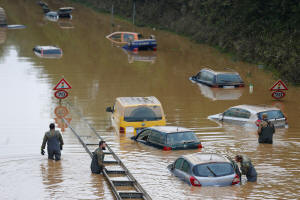German, Belgian flood deaths rise to 157 as search continues
 Send a link to a friend
Send a link to a friend
 [July 17, 2021]
By David Sahl and Philip Blenkinsop [July 17, 2021]
By David Sahl and Philip Blenkinsop
WASSENBURG, Germany/BRUSSELS (Reuters) -
Rescue workers searched flood-ravaged parts of Germany and Belgium for
survivors on Saturday after burst rivers and flash floods this week
collapsed houses and claimed at least 157 lives.
Some 133 people have died in the flooding in western Germany, in the
country's worst natural disaster in more than half a century. That
included about 90 in the Ahrweiler district south of Cologne, according
to police. Hundreds of people are still missing.
Around 700 residents were evacuated late on Friday after a dam broke in
the town of Wassenberg near Cologne, authorities said.
"Water levels have been stabilising since last night, one can say the
situation is stable," Wassenberg mayor Marcel Maurer said. "It's too
early to give the all-clear but we are cautiously optimistic."
In Belgium, the death toll rose to 24, according to the national crisis
centre, which is coordinating the rescue effort.
"Unfortunately, we have to assume that this figure will continue to rise
in the coming hours and days," the centre said in a statement. About 20
people are still missing.

Over the past several days the floods, which have mostly hit the German
states of Rhineland Palatinate and North Rhine-Westphalia and eastern
Belgium, have cut off entire communities from power and communications.
In the southern Belgian provinces of Luxembourg and Namur, authorities
rushed to supply drinking water to households without a clean supply.
Water levels slowly fell in the worst hit parts of Belgium, though the
crisis centre said the situation could worsen in the afternoon along the
Demer river closer to Brussels, with about 10 houses under threat of
destruction.
Belgian rail network operator Infrabel published plans of repairs to
lines, some of which would be back in service only at the very end of
August.
DUTCH ON HIGH ALERT
Emergency services in the Netherlands also remained on high alert as
overflowing rivers threatened towns and villages throughout the southern
province of Limburg.
[to top of second column]
|

Members of the Bundeswehr forces, surrounded by partially submerged
cars, wade through the flood water following heavy rainfalls in
Erftstadt-Blessem, Germany, July 17, 2021. REUTERS/Thilo Schmuelgen

Tens of thousands of residents in the region have been evacuated in
the past two days, while soldiers, fire brigades and volunteers
worked frantically throughout Friday night to enforce dykes and
prevent flooding.
The Dutch have so far escaped disaster on the scale of its
neighbours, and as of Saturday morning no casualties had been
reported.
Belgian Prime Minister Alexander De Croo and European Commission
President Ursula von der Leyen were set to visit Pepinster, where
houses were washed away, on Saturday afternoon.
German President Frank-Walter Steinmeier and Armin Laschet, state
premier of North Rhine-Westphalia, were also scheduled to visit
Erftstadt, one of the hardest hit towns.
Laschet is ruling CDU party's candidate in September's general
election. The devastation of the floods could intensify the debate
over climate change ahead of the vote.
Scientists have long said that climate change will lead to heavier
downpours. But determining its role in these relentless downpours
will take at least several weeks to research, scientists said on
Friday.
(Reporting by Christoph Steitz in Frankfurt, David Sahl in
Wassenburg, Philip Blenkinsop in Brussels, Bart Meijer in Amsterdam;
Editing by Frances Kerry)
[© 2021 Thomson Reuters. All rights
reserved.] Copyright 2021 Reuters. All rights reserved. This material may not be published,
broadcast, rewritten or redistributed.
Thompson Reuters is solely responsible for this content.
 |